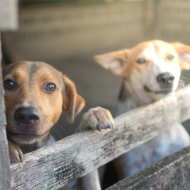
Innovative research uses cortisol concentrations as a marker of stress
A new study from the University of Glasgow – part-funded by the Universities Federation for Animal Welfare (UFAW) – revealed that dogs from South Korean meat farms experience high levels of chronic stress.
An estimated 2.5 million dogs are eaten each year in South Korea. Despite wide-spread condemnation of the practice, it remains popular due to tradition and its supposed effects on health. Evidence has shown that dog meat farms are often unregulated, with animals kept in poor conditions.
This is the first study to report hair cortisol concentrations as a marker of stress, and therefore welfare status. Researchers aimed to assess if dogs surrendered from meat farms exhibited higher concentrations of the hormone in hair compared to pet dogs in the same area. The study used 84 pet dogs from Seoul and 86 dogs from ten different dog meat farms close to the city. The farmed dogs had been voluntarily surrendered to the charities Save Korean Dogs and Human Society International (HSI).
The results, published in UFAW’s journal Animal Welfare, revealed that dogs from meat farms had higher concentrations of cortisol than pet dogs, suggesting higher levels of chronic stress.
One of the authors of the study, Professor Neil Evans from the University of Glasgow’s Institute of Biodiversity, said: “While the concentration of cortisol is only one measure of stress, our research provides the first quantitative evidence that dogs in meat farms are kept in conditions associated with poor welfare and identifies the need for better welfare law to protect farmed dogs.
“Our findings could also inform those who consume dog meat of the potential long-term physiological suffering of these dogs, and could bring about a re-evaluation of the cultural beliefs regarding the consumption of dog meat.”



 The Veterinary Medicines Directorate (VMD) is inviting applications from veterinary students to attend a one-week extramural studies (EMS) placement in July 2026.
The Veterinary Medicines Directorate (VMD) is inviting applications from veterinary students to attend a one-week extramural studies (EMS) placement in July 2026.